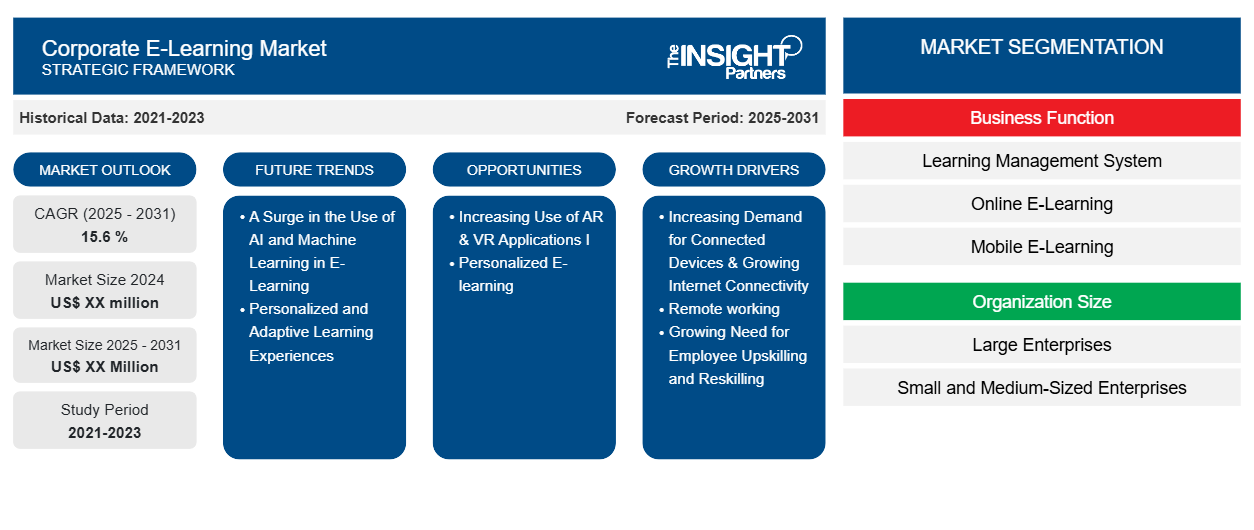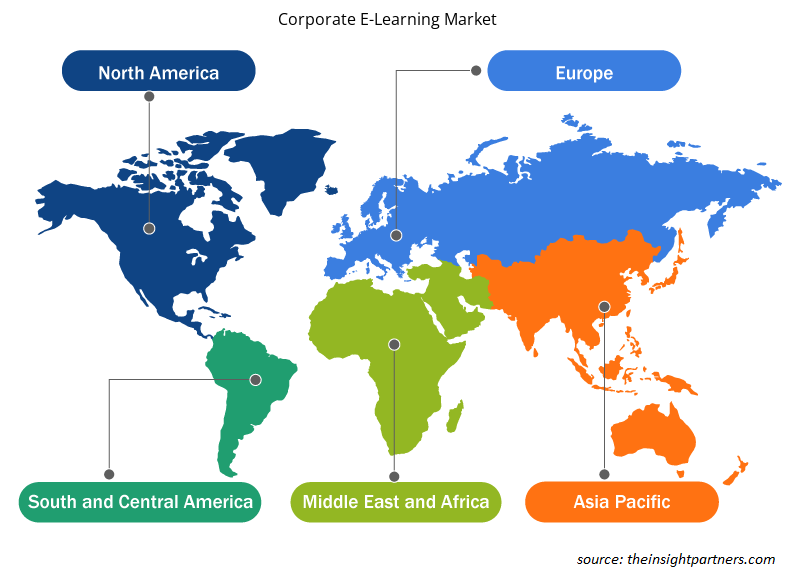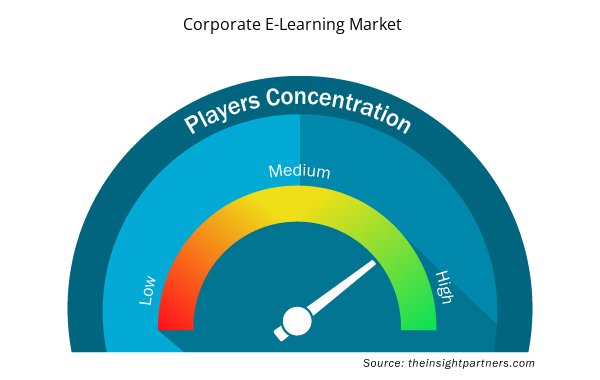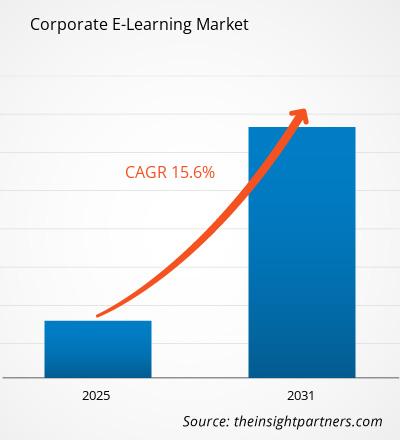The Corporate E-Learning Market is expected to register a CAGR of 15.6 % from 2025 to 2031, with a market size expanding from US$ XX million in 2024 to US$ XX Million by 2031.
The report is segmented By Business Function (Learning Management System (LMS), Online E-Learning, Mobile E-Learning, Others), Organization Size (Large Enterprises, Small and Medium-Sized Enterprises), Deployment (Cloud, On-Premises). The global analysis is further broken-down at regional level and major countries. The report offers the value in USD for the above analysis and segments
Purpose of the Report
The report Corporate E-Learning Market by The Insight Partners aims to describe the present landscape and future growth, top driving factors, challenges, and opportunities. This will provide insights to various business stakeholders, such as:
- Technology Providers/Manufacturers: To understand the evolving market dynamics and know the potential growth opportunities, enabling them to make informed strategic decisions.
- Investors: To conduct a comprehensive trend analysis regarding the market growth rate, market financial projections, and opportunities that exist across the value chain.
- Regulatory bodies: To regulate policies and police activities in the market with the aim of minimizing abuse, preserving investor trust and confidence, and upholding the integrity and stability of the market.
Corporate E-Learning Market Segmentation
Business Function
- Learning Management System
- Online E-Learning
- Mobile E-Learning
- Others
Organization Size
- Large Enterprises
- Small and Medium-Sized Enterprises
Deployment
- Cloud
- On-Premises
Geography
- North America
- Europe
- Asia-Pacific
- South and Central America
- Middle East and Africa
Customize This Report To Suit Your Requirement
You will get customization on any report - free of charge - including parts of this report, or country-level analysis, Excel Data pack, as well as avail great offers and discounts for start-ups & universities
Corporate E-Learning Market: Strategic Insights

- Get Top Key Market Trends of this report.This FREE sample will include data analysis, ranging from market trends to estimates and forecasts.
Corporate E-Learning Market Growth Drivers
- Skill Gap Mitigation and Workforce Upskilling: The rapid technological evolution and dynamic business landscapes are driving corporate e-learning as a critical strategy for addressing skill gaps and maintaining workforce competitiveness. Organizations are experiencing unprecedented technological disruption, requiring continuous learning and development to keep pace with emerging skills and knowledge domains. Corporate e-learning platforms enable businesses to rapidly deploy targeted training programs, facilitate continuous professional development, and create adaptive learning ecosystems that can quickly respond to changing skill requirements. This driver reflects the urgent need for agile, scalable learning solutions that can transform workforce capabilities in real-time.
- Remote Work and Distributed Workforce Learning: The transformative shift towards remote and hybrid work environments is accelerating corporate e-learning adoption. Organizations require flexible, accessible learning platforms that can effectively train and engage distributed workforces across multiple geographical locations and technological infrastructures. E-learning solutions provide scalable, standardized training methodologies that ensure consistent skill development, knowledge transfer, and organizational alignment regardless of physical work arrangements. This driver emphasizes the critical role of digital learning platforms in maintaining workforce connectivity, productivity, and continuous professional development in increasingly decentralized work environments.
Corporate E-Learning Market Future Trends
- Micro-Learning and Skill-Focused Content Strategies: The corporate e-learning market is experiencing a significant trend towards micro-learning and highly targeted, skill-focused content strategies. Organizations are moving away from traditional lengthy training modules towards more digestible, just-in-time learning experiences that can be quickly consumed and immediately applied. This trend emphasizes creating modular, bite-sized learning content that supports flexible, on-demand skill acquisition, enables continuous learning, and aligns with modern workforce preferences for personalized, efficient knowledge development. By supporting more agile, focused learning approaches, corporate e-learning platforms can enhance workforce adaptability and learning effectiveness.
- Increased Use of Data Analytics to Measure Learning Effectiveness: As organizations continue to invest in e-learning platforms, there is an increasing focus on leveraging data analytics to measure the effectiveness of training programs. Learning management systems (LMS) and other e-learning platforms are now incorporating advanced analytics tools that track learner progress, engagement, and performance. These data-driven insights allow businesses to assess the impact of training on employee performance and organizational goals. By analyzing metrics such as completion rates, test scores, and real-world application, companies can continuously refine their training programs, making them more effective and aligned with business outcomes. This trend is helping businesses ensure that their e-learning initiatives provide measurable ROI and tangible improvements in employee performance.
Corporate E-Learning Market Opportunities
- Artificial Intelligence and Personalized Learning Experiences: The integration of artificial intelligence and machine learning technologies presents a transformative opportunity in the corporate e-learning market. Advanced AI-powered platforms can deliver highly personalized, adaptive learning experiences that dynamically adjust content, pace, and complexity based on individual learner profiles and performance. These intelligent systems can provide real-time feedback, identify skill gaps, recommend targeted learning paths, and create immersive, interactive training experiences. The opportunity extends beyond traditional learning management, offering organizations the ability to develop sophisticated, data-driven learning ecosystems that optimize workforce skill development and knowledge acquisition.
- Immersive Learning Technologies: The emergence of immersive technologies like virtual reality (VR), augmented reality (AR), and mixed reality creates a significant opportunity for innovative corporate e-learning solutions. These technologies can transform traditional training approaches by creating engaging, interactive learning environments that simulate real-world scenarios, enable experiential learning, and provide safe spaces for skill practice and knowledge application. Immersive learning platforms can support complex training requirements in industries like manufacturing, healthcare, technical services, and emergency response, offering unprecedented levels of engagement, retention, and practical skill development.
Corporate E-Learning Market Regional Insights
The regional trends and factors influencing the Corporate E-Learning Market throughout the forecast period have been thoroughly explained by the analysts at Insight Partners. This section also discusses Corporate E-Learning Market segments and geography across North America, Europe, Asia Pacific, Middle East and Africa, and South and Central America.

- Get the Regional Specific Data for Corporate E-Learning Market
Corporate E-Learning Market Report Scope
| Report Attribute | Details |
|---|---|
| Market size in 2024 | US$ XX million |
| Market Size by 2031 | US$ XX Million |
| Global CAGR (2025 - 2031) | 15.6 % |
| Historical Data | 2021-2023 |
| Forecast period | 2025-2031 |
| Segments Covered |
By Business Function
|
| Regions and Countries Covered | North America
|
| Market leaders and key company profiles |
Corporate E-Learning Market Players Density: Understanding Its Impact on Business Dynamics
The Corporate E-Learning Market market is growing rapidly, driven by increasing end-user demand due to factors such as evolving consumer preferences, technological advancements, and greater awareness of the product's benefits. As demand rises, businesses are expanding their offerings, innovating to meet consumer needs, and capitalizing on emerging trends, which further fuels market growth.
Market players density refers to the distribution of firms or companies operating within a particular market or industry. It indicates how many competitors (market players) are present in a given market space relative to its size or total market value.
Major Companies operating in the Corporate E-Learning Market are:
- Absorb Software Inc
- Adobe Systems
- Cornerstone
- SAP SE
- Skillsoft Corporation
- Oracle
Disclaimer: The companies listed above are not ranked in any particular order.

- Get the Corporate E-Learning Market top key players overview
Key Selling Points
- Comprehensive Coverage: The report comprehensively covers the analysis of products, services, types, and end users of the Corporate E-Learning Market, providing a holistic landscape.
- Expert Analysis: The report is compiled based on the in-depth understanding of industry experts and analysts.
- Up-to-date Information: The report assures business relevance due to its coverage of recent information and data trends.
- Customization Options: This report can be customized to cater to specific client requirements and suit the business strategies aptly.
The research report on the Corporate E-Learning Market can, therefore, help spearhead the trail of decoding and understanding the industry scenario and growth prospects. Although there can be a few valid concerns, the overall benefits of this report tend to outweigh the disadvantages.
- Historical Analysis (2 Years), Base Year, Forecast (7 Years) with CAGR
- PEST and SWOT Analysis
- Market Size Value / Volume - Global, Regional, Country
- Industry and Competitive Landscape
- Excel Dataset



Report Coverage
Revenue forecast, Company Analysis, Industry landscape, Growth factors, and Trends

Segment Covered
Business Function, Organization Size, Deployment

Regional Scope
North America, Europe, Asia Pacific, Middle East & Africa, South & Central America

Country Scope
This text is related
to country scope.
Frequently Asked Questions
Skill gap mitigation and workforce upskilling and remote work and distributed workforce Learning are the major factors driving the corporate e-learning market
The report can be delivered in PDF/PPT format; we can also share excel dataset based on the request
Micro-learning and skill-focused content strategies to play a significant role in the global corporate e-learning market in the coming years
The Corporate E-Learning Market is estimated to witness a CAGR of 15.3% from 2023 to 2031
Trends and growth analysis reports related to Technology, Media and Telecommunications : READ MORE..
- Absorb Software Inc.
- Adobe Systems
- Cornerstone
- SAP SE
- Skillsoft Corporation
- Oracle
- Infor
- Cornerstone
- Citrix Systems Inc.
- Coursera Inc.
- Udemy Inc.

 Get Free Sample For
Get Free Sample For